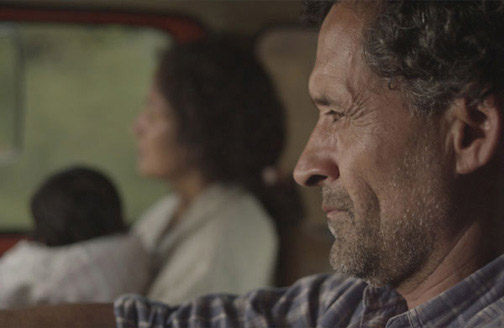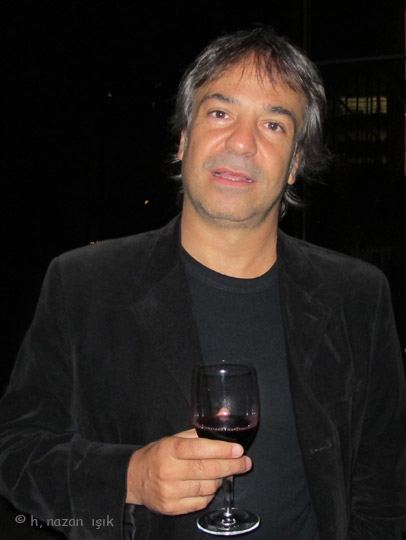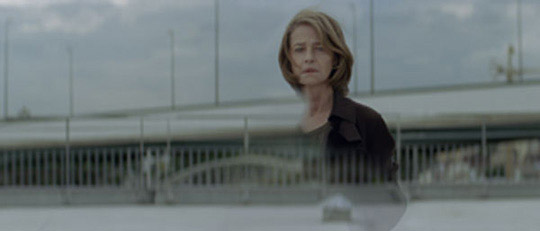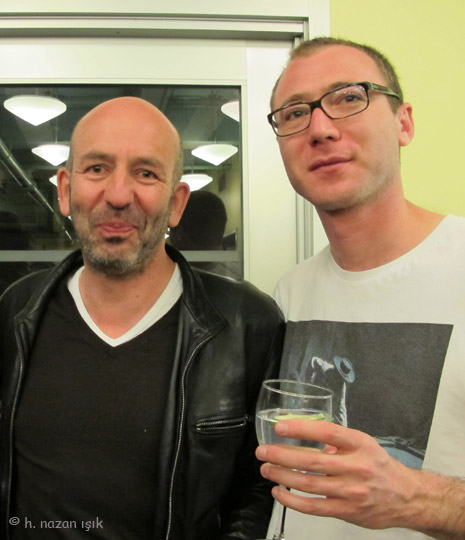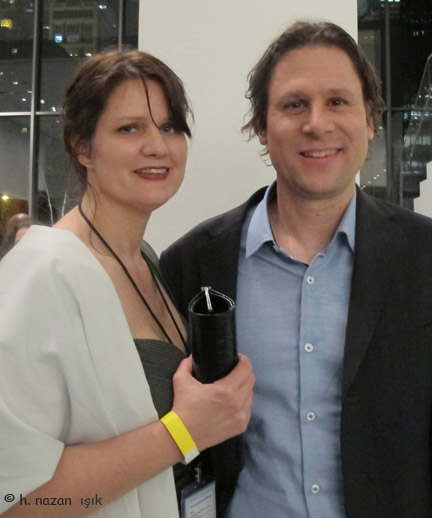h. nazan ışık—
3 April, 2012—
New Directors/New Films (NDNF) Festival 21 March-1 April, has come and gone. In my previous two articles I talked about the movies I liked. During the festival, I had a chance to meet some of the directors and producers and talked about their movies. Now, in this last part I would like to introduce to you people who made them.
Pablo Giorgelli talks about (on his movie “Las Acacias”:
Rubén (Germán de Silva) and his passengers in Pablo Giorgelli’s movie “Las Acacias” .
If a movie is set mostly in a truck with mainly three characters and takes place in a 1500 kilometers road trip (journey), would it be worth to go and see it? The answer for Pablo Giorgelli’s film “Las Acacias” is yes.
Rubén is a lonely, not very talkative middle age truck driver who transports wood (lumber, timber) from Asunción, Paraguay to Buenos Aires. He does it regularly, but this time this trip is different: As a favor to his boss, he has to give a ride to a young woman, Jacinta (Hebe Duarte). To his surprise, Jacinta comes with a five mount old baby. Rubén asks, “Baby is yours?” This is the opening dialog of the film. Let’s hear the rest from the director Pablo Giorgelli.
© h. nazan ışık
Pablo Giorgelli at the MoMA
This is your fist movie, isn’t it? Why this one?
Pablo Giorgelli: Yes it is my first movie, but it took me five years to make it. I always thought my first film would be another film. Before Las Acacias, I was writing two scripts, one of them was also about family, actually about my grandmother, but some personal and economic reasons I couldn’t make this script and I spent time with my family. And, at that time, the idea for Las Acacias was born.
What kind of problems?
P.G.: My Father got very sick, the sickness of my father…, the economic crisis that we had in Argentina, I lost my job, I separated from my long-term girlfriend at that time…..
The title of the film: Why did you name it Las Acacias?
P.G.: For three reasons. First is more literal: The trees were transported in the film are acacias. Second reason is: It is a very ordinary tree; you can find acacia in everywhere in Argentina; in Buenos Aires, on the sidewalks, in the countryside, in everywhere. And finally, I wanted to be more poetic, I wanted a relationship between acacia and Rubén, he is like an acacia, very hard, strong, but very noble at the same time, and very coman like acacia, not very special yet very beautiful like ordinary people, like everybody….That was the idea, and I wanted the title to be not very explanatory.
If you explain your movie in one sentence, what would it be? A road movie, a relationship, love story, loneliness…?
P.G.: It is a fatherhood love story. It is a general fatherhood. He is a man with a big hole about fatherhood. He has a son, but we don’t know why he didn’t see his own child for sometime. It was so important for him when he saw the woman with a child. And in the movie the first line was “ Baby is yours?”.
Are you a father?
P.G.: (With a big happy smile), Not yet, but baby is on the way, soon!
The baby was a very important character in the movie, an adorable child with big warm eyes. How did you cast her?
P.G.: We saw 250 babies, and this one came, that was it; she had no fear, she was so special, so friendly. In the movie we used two babies and a seven-kilo doll for the actress to carry.
What about the actors?
P.G.: He is mainly a theater actor, but also played played secondary roles in a lot of films. She is not an actor, first time for her. She worked as a production assistant. She was, her face was perfect for me, and we decided on her.
When soldiers questioned her about the father of the baby, her answer was, “She has no father, this is my last name”. Did you write that line to tell us that she is not married, or tell us about the system?
P.G.: It was mostly about the system. In Argentina if you want to leave the country with a minor, you must have permission from both mother and father. And it is necessary to control the child trafficking.
What part, which scene of the movie you like the most?
P.G.: One of my favored parts is the last scene; because he finally can speak, he can express himself, maybe first time in his life. This scene was written at the very beginning, I changed some dialogs, but the scene was always the same. And the movie is also about how difficult for this man to speak…
If you had a chance to reedit your film what would you change?
P.G.: My wife is the editor; we worked on that several months. For me now, it is almost OK, the rhyme, the length is OK. Maybe some dialogs…some dialogs sound like comedy…maybe those.
If you were a journalist what would you ask the director Pablo Giorgelli about this film?
P.G.: Well… about the movie! It is a difficult question.., I would ask about the shooting, it was difficult because of the baby, that’s why we used two babies and a doll.
What is your next project?
P.G.: For the moment it is the project that I mentioned before, a relationship between a grandmother and a grandchild. But, I always want to make action movie too.
I had so many more questions to ask, especially about relationship, fatherhood, and his relationship with his father, it was time for him to go back to the theater for a Q&A.
Producer Peter Frenkel on The End.
Film Society of Lincoln Center
Charlotte Rampling in Didier Barcelo’s film The End.
The End was one of the twelve short movies were shown in the ND/NF Festival. It is short, 16 minutes, but subject is deep, sensitive, different, and told beautifully.
It is about a very famous acctress’ (Charlotte Rampling) unexpected, sad discovery about her movies; one day at home, one of her old movie is on TV, she sees that she, her part in the movie was played by a young actress. She realizes that she is not in her films, she has been replaced by a younger face….
I had a chance to meet with the director Didier Barcelo and the producer Peter Frenkel. And interviewed Mr. Frenkel via e-mail.
Director Didier Barcelo, left, and Producer David Frenkel
Would you tell us about your background, did you study film, is it your time in New York?
David Frenkel : I’ve studied cinema working at Why not productions, one of the leading independent French production company. No, this is not my first time; I’ve lived for a year and half in NYC. It’s like my second home. And being back here with a movie selected at ND/NF is an honor.
How did you (director/producer) get together? Why did you make this film, would you describe it please, and why short?
D.F.: Didier has been introduced to me through my business partner, Arno Moria, who runs a commercial production company in France, called Les Télécréateurs. Didier was directing commercials for this company.
He came to me with a project, a feature film, currently entitled Cassandra and the Mayers, which will be his first feature. But first, in order to get to know each other, and because I though it was important for him in his creative process, we’ve decided it would be important to do a short film together, which happened to be The End.
Casting? Did you know Charlotte Rambling and Gérard Darmon before? How did you get them to play?
D.F.: We did not know personally neither Charlotte Rampling nor Gérard Darmon. A friend of mine, a painter actually, made a short film with her few years ago. That way, we could have access to her personal address (we thought that going through her agent would be an endless process for this type of film). So I’ve dropped the script along with two personal letters in her mailbox. And one day, having a nightmare trying to feed my one and half year old kid, she called me saying she read it, loved it and was in. Once we got her in the project, all the other actors (event if it took a while, because of everybody’s busy schedule) wanted to be part of it.
How was it to work with Charlotte Rampling and Gérard Darmon, (intimidating, tense, easy, fun……. ) were you always on set?
D.F.: Working with Charlotte Rampling and Gérard Darmon makes things easier in a way: because having them on set obliges you being even more professional and forces you pushing your own limits. And yes, I was always on set.
What part of the process you like the most? writing, casting, filming, editing…? What scene of “The End” you like the most?
D.F.: The production of this short was like a dream come true. We were surrounded by a wonderful crew (DoP, first AD, line producer etc…). The building and the filming of the ‘studio set’ was very impressing and moving as well, especially when you have Charlotte Rampling facing ‘the tennis-ball Michel Piccoli’
As a producer are you happy with the film, if you had a chance to reedit it, would you change anything?
D.F.: Once the movie is done, I can’t ask myself this question
I have a question I ask everyone I interview; if you were a journalist what would you ask the producer about this movie? And your answer?
D.F.: Do you intend to write/produce a feature based on that story? Indeed, we deeply think here is a subject that could be extended into a feature either in France or even with an American cast. Few people may be interested.
What is next?
D.F.: We submit the script Cassandra and the Mayers to the Sundance Film Institute. We’ll see… And we’ll start casting for his first feature, which we hope to make next year. Cassandra and the Mayers: here is all I can say for now:
Alex is a Frenchman in his forties who arrives in Athens to come find his father, Leo, after receiving a strange distress call.
It will be both funny and touching maybe having the same tone and temperature that The Descendants by Alexander Payne.
Jason Cortlund and Julia Halperin on their movie Now, Forager
.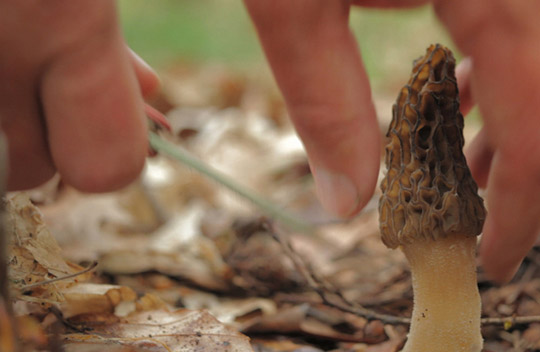 Film Society of Lincoln Center
Film Society of Lincoln Center
Jason Cortlund is the writer, Julia Halperin and Jason Cortlund are the co-directors and Julia Halperin is the editor of Now, Forager. Instead of me explaining it, I decided have them to introduce the movie.
Julia Harperin and Jason Cortlung the Opening Night reception at MoMA
Why did you make this film, how would you describe your movie?
Julia Halperin: Now, Forager is a narrative feature about a husband and wife who hunt for wild mushrooms and sell them New York restaurants.
Most food movies are really just about eating. We wanted to evolve the genre for a contemporary, kitchen-savvy audience. This story is about people who work with food for a living. We shot in all five boroughs of the city, the Hudson Valley, and the woods of New Jersey over the course of a year to capture seasonal changes and different species of flora, fauna, and fungi. The restaurant locations are all real, working kitchens.
The film is also about a relationship. And in the same way that not all food movies have to be about eating, not all love stories have to be about falling in love. There are other parts of the cycle that are worth exploring, and that are maybe even more interesting at the end of the day.
Please walk me through your creative process. Idea, script, getting money, filming, editing,……and being part of ND/NF.
Jason Courtlund: We had a long development process. It started back in 2005 with the idea of making a food movie where food and cooking was treated very realistically. I worked on the script in parallel with another project that we’re planning to do next. Hunting, fishing, and foraging for wild food are things that I’ve done my whole life (it’s a big part of my family’s culinary traditions). I thought it would be interesting to make a film about these processes.
Julia and I were able to cobble together a very modest budget—enough to start production. We began casting lead actors in the fall of 2009. Friends in the New York theater and film communities made recommendations, so were able to find many collaborators through word-of-mouth.
Since the story takes place over the course of a year, our production schedule would have to be spread out in order to shoot exteriors in the correct seasons. We began with 2 days of spring scenes in May 2010. We rehearsed and cast supporting roles over the summer. Principal photography started in October 2010 – fall exteriors and all of our interior scenes – and continued through the first of November. In late December, we shot a couple days of winter exteriors. The following May 2011, we had a few more days of spring re-shoots and pickups.
Julia began editing in December 2010. Post-production continued for just over a year – we relocated from Brooklyn to Austin, Texas (where we both went to grad school) to reduce our cost of living. We showed the film as a work-in-progress in November 2011 in Poland as part of a co-production market called US-In-Progress (part of The American Film Festival). There we met found a sales agent (New Europe Film Sales) and a co-producer (Monternia.pl) who would help us finish the film.
We had our world premiere in January 2012 at International Film Festival Rotterdam. We were really happy to have sold out screenings, high rankings in the audience voting, and an enthusiastic response from the international press.
To follow that up with a North American premiere at New Directors/New Films is such a great honor. Now, Forager is (by design) very different from a lot of other small, independent American films. For MoMA and Film Society of Lincoln Center to offer it this recognition—it’s a special experience. And we’re very grateful.
Which came first as an idea; love or mushrooms? Why and how?
Jason: Mushrooms came first. The very first draft of the story was just about Lucien. It was very hard to dramatize some of the ideological conflicts. Early in the writing process, our friend Athina Rachel Tsangari (director of Attenberg) insisted that there be a romantic connection for the lead character. So at that point, I split Lucien in two – leaving him as the chief foraging woodsman and making his wife, Regina, more of the professional kitchen expert.
Why “end of a relationship…”?
Julia: We see a lot of films about beginnings of relationships – the process of falling in love. So partly, it came out of an interest to focus on a different part of that process. And since mushrooms are generally associated with decay and regeneration, there were some interesting parallels to work with there between the human and botanical worlds.
How did you two get together? Is this your first movie as a team?
Jason: Julia and I met in graduate school. We started making films together in 1996. At first, we traded off producing and directing duties – but eventually we evolved a process for co-directing that works well for us. We’ve made several short films, videos, and installations together. This is our first feature-length narrative.
Who likes mushrooms more? Who is a better cook?
JULIA: Jason is really the one who spends time studying mushrooms. He’s the editor for the New York Mycological Society’s quarterly newsletter. We both like to cook, but I have to give him the edge in the kitchen as well. He also tends a garden year round so there’s always something nice to eat (right now it’s fresh fava beans and nasturtium flowers).
Casting? You wrote, co-directed and act in your movie; Did you act before?
JASON: Acting was a first love for both me and Julia—we actually both performed in school and community theater into our early 20s. Though we’ve gone on to focus on different film specialties in college and grad school, we’ve continued to keep up our study of acting and performance as a way of complementing our skills behind the camera.
JULIA: Lucien wasn’t actually written with Jason in mind. We did hold auditions for the part. During casting, we were occasionally short of a male to read with a potential Regina, so Jason sat in to read Lucien.
When we later reviewed the tapes, it was clear that he understood some key complexities of the character that other actors had trouble with. Lucien’s unwillingness to compromise makes him really unlikable at times – and that stubbornness and hard-scrabble independence is really a critical element to having this story work. If an actor is worried about being seen in a favorable light, then the character—and the film as a whole—doesn’t work.
What part of the process you like the most?, writing, casting, filming, editing…?
JASON: Filming is probably my favorite part. Things are in motion, progress is happening, and something that you made up on paper is being actualized. And, when you have a good crew like we did, the camaraderie is really energizing.
What scene of “Now, Forager” you like the most?
JASON: My favorite day of shooting was probably the day that we butchered the fish – and I think it turned into a great sequence. We had these two enormous, whole striped bass that had just been caught the day before. There was definitely some nervous excitement on the set – we needed to get the sequence right for both performance and camera and we really only had 2 chances. Our DP (Jonathan Nastasi) rigged an overhead camera so that all the action could be seen in a single take. Then it was up to me to process the fish. This is something I’ve been doing since I was a little kid, part of the skills you learn hunting and fishing, and I really enjoy it. But it’s a different experience to perform it for a camera, when you know that the finer details are all magnified. I like to think that my grandfather, who first taught me all this, was there helping to guide my fillet knife. Both takes ended up being great.
If you had a chance to reedit it, would you change anything?
JULIA: Oh, there are thousands of things to change if you let yourself go there. The editing process can potentially go on forever. Werner Herzog recently said something to the effect of ‘love your films for the crippled children that they are’. I think that striving for excellence is important, but it’s a slippery slope into perfectionism where you can never finish what you’ve started.
If you were a journalist what would you ask Jason Cortlund and Julia Halperin about this movie?
JASON: I guess one question that we surprisingly haven’t been asked yet is “Did you eat the mushrooms seen in the film?” The answer would be yes – but only the edible ones. Because you can’t predict what mushrooms you might find when you have a cast and crew on location, many of the fungi in the film were just shot by me alone in the woods over the course of the year. With our excellent cinematographer, Jonathan Nastasi, we designed a very specific look for our mushroom shots so I was able to maintain a consistent depth of field and visual style that would match his footage.
JULIA: We’ve been asked about how the film fits in to the “Slow Food” philosophy. The content of the film is very much in line with Slow Food: we’re interested in local, seasonal, authentic ingredients sourced and prepared with great care. But we also subscribe to what you could call a “Slow Filmmaking” ethos. It’s an artisanal film. We worked intimately, collaboratively, and sustainably. We used a small crew, we were careful to communicate honestly and leave our natural locations in good condition. Even though filmmaking is always difficult, we’re not interested in duplicating the often-exploitive practices of assembly-line filmmaking.
What is next?
JASON: Our next film is about two brothers in the mountains of Oregon who illegally cut down trees at night in National Forests and sell them on the black market. It’s called Lumberjunkies. The script was an honorable mention for this year’s Hearst Screenwriting grant, and we’re just ramping up our fundraising and development.
© h. nazan ışık
Photos © h. nazan ışık/nkendiken

